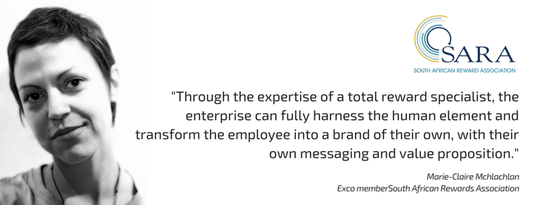|
Employee engagement has become synonymous with productivity and passion and a healthy bottom line. “Employee engagement boils down to positive emotional associations and trust in an organisation,” explains Marie-Claire Mclachlan, South African Rewards Association (SARA) exco member.
An engaged employee outperforms the average with a commitment to the organisation which goes beyond the salary and into the personal. Research undertaken by Gallup has shown that organisations which increase the number of talented managers and double the rate of engaged employees achieve, on average, 147% higher earnings per share. And yet, the same research has shown that only 13% of employees are engaged worldwide. “To build this, to truly engage with the employee, it’s valuable to have a total reward specialist on board who can keep up to date with what the science is saying when it comes to total reward and engagement and who knows how to implement in the right way,” says Mclachlan. A specialist insight The rules of employee engagement have changed significantly over the past few years and yet many companies continue to use old total reward practices which have the opposite effect to the positive intent. This is largely because the older methodologies were structured around the command-and-control industrial-era organisational setting as opposed to today’s workplace realities. “A total reward specialist is able to instantly assess whether or not the systems in play are counterintuitive and how to address these so as to ignite employee engagement,” says Mclachlan. “Their value is found in their understanding of how best to engage with an employee within a specific environment using the latest research and tools. Their skills also ensure the organisation’s total reward efforts, including remuneration and benefits, are structured properly and that motivational drivers across employee ages and stages are properly taken into account.” While it may sound like a lot of effort just to tick a corporate box, there are tangible results linked to an engaged workforce. A Cvent survey found that customer retention rates are 18% higher on average and further research by the Temkin Group established that engaged employees were 2.5 times more likely to stay late if required, twice as likely to offer help and more than three times as likely to do something good for the company without being asked. A business value “Engaged workforces mean greater employee satisfaction, an increase in customer satisfaction and lower rates of attrition,” says Mclachlan. “Amongst the many benefits, organisations hold onto talent for longer, they experience lower accident and safety incidents and there is a measurable, positive impact on the bottom line.” Through the expertise of a total reward specialist, the enterprise can fully harness the human element and transform the employee into a brand of their own, with their own messaging and value proposition. “The employer brand works in exactly the same way as the consumer brand. You can have a fantastic value proposition but fail in delivering the promise. Like most things, it comes down to the execution and how the business delivers on its total reward promises will impact engagement,” concludes Mclachlan. “There is a need to empower management by giving them the skills they require to engage with employees properly and to use the organisation’s total reward tools effectively. Poor management and bad communication will only serve to damage any plans put in place, and a total reward specialist can ensure this is addressed in the right way to deliver the right results.” ENDS MEDIA CONTACT: Cathlen Fourie, 012 644 2833, [email protected], www.atthatpoint.co.za For more information on SARA please visit: Website: www.sara.co.za Twitter: @SA_reward LinkedIn: South African Reward Association Facebook: SARA – South African Reward Association
0 Comments
|
Archives
March 2023
Welcome to the South African Reward Association newsroom.
Categories
All
|


 RSS Feed
RSS Feed